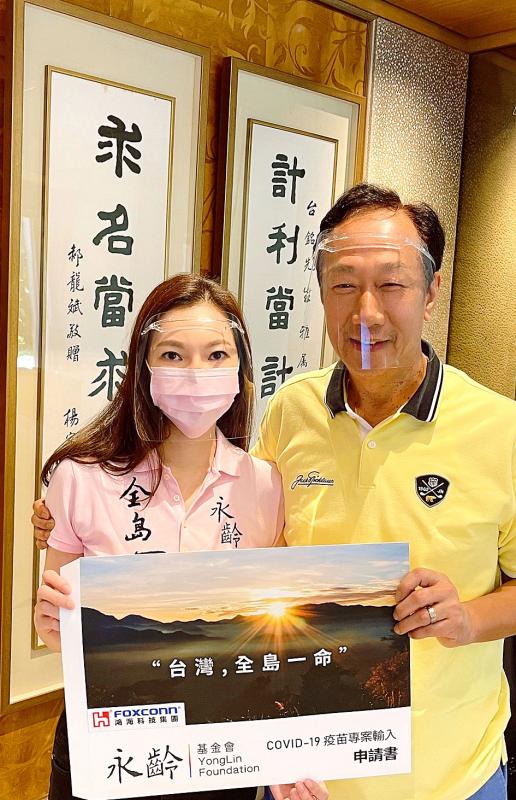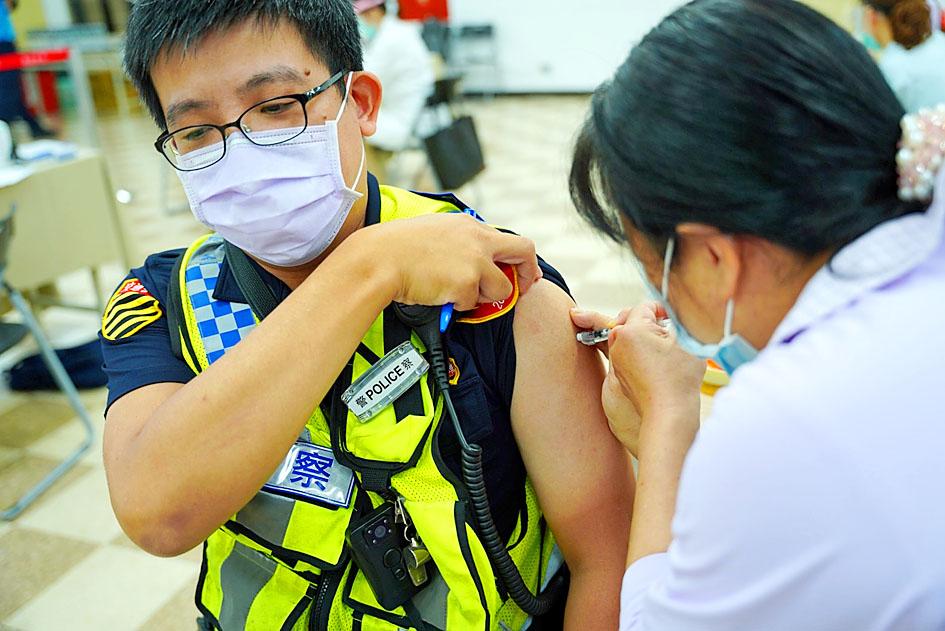The Central Epidemic Command Center (CECC) yesterday confirmed that the Yonglin Foundation had submitted documents, including the substantial information required, to the Food and Drug Administration (FDA) for approval to import the Pfizer-BioNTech COVID-19 vaccine.
Minister of Health and Welfare Chen Shih-chung (陳時中), who heads the center, on Monday said that the FDA and the Centers for Disease Control had received six requests from companies or groups expressing their intent to import COVID-19 vaccines, but that none had provided the required documentation.
The CECC on Friday last week released a set of requirements for those who intend to import COVID-19 vaccines.

Photo courtesy of Terry Gou’s office
They include having a commissioned pharmaceutical firm submit its execution plan, product instructions, quantity and calculation basis, cold storage logistics plans, delivery schedule, vaccine expiration date, dealership authorization from the vaccine manufacturer, and a free sale certificate or replacement documents.
Yonglin Foundation founder Terry Gou (郭台銘) wrote on Facebook on Saturday that the group would commission a registered pharmaceutical firm to submit an application to import vaccines along with the required documents.
The foundation would apply to import 5 million doses of the Pfizer-BioNTech COVID-19 vaccine that is manufactured and packaged in Germany, as the law prohibits groups from importing vaccines made in China, said Gou, the founder of Hon Hai Precision Industry Co (鴻海精密).

Photo copied by Yao Yueh-hung, Taipei Times
Delia Tseng (曾馨瑩), Gou’s wife, handed the foundation’s application in person to FDA Director-General Wu Shou-mei (吳秀梅).
Chen said the CECC had expressed its gratitude to Gou, and the FDA had begun reviewing the foundation’s application, as it included the substantial information required.
The center would keep in touch with the foundation to ensure that the application proceeds smoothly, he said.
Meanwhile, Sun Yat-sen School president Chang Ya-chung (張亞中), who on Saturday said that friends in China had agreed to donate 5 million doses of the Pfizer-BioNTech COVID-19 vaccine and 5 million doses of vaccine made by Chinese state-owned company Sinopharm (國藥集團), yesterday said that he had submitted an application to import vaccines on Monday.
Deputy Minister of the Interior Chen Tsung-yen (陳宗彥), who is deputy head of the center, confirmed that Chang submitted an application, but that it only included a copy of an authorization letter from a “Beijing Cross-Strait Oriental Cultural Center” (北京兩岸東方文化中心) and none of the other required documentation.
In related news, Premier Su Tseng-chang (蘇貞昌) said that vaccination centers would eventually be set up in a variety of locations, including military bases, prisons, and technology and industrial parks.
Su made the remarks at a Cabinet meeting, Executive Yuan spokesman Lo Ping-cheng (羅秉成) said, adding that Su was briefed by Minister Without Portfolio Audrey Tang (唐鳳) about a vaccine reservation system being developed with the Ministry of Health and Welfare.
Once vaccines become available, they could be reserved online in a process similar to the mask reservation system set up last year, Lo quoted Tang as saying.
Reservations could be made using the National Health Insurance app, or at supermarkets and pharmacies, he added.
Additional reporting by Lee Hsin-fang

TRAGEDY STRIKES TAIPEI: The suspect died after falling off a building after he threw smoke grenades into Taipei Main Station and went on a killing spree in Zhongshan A 27-year-old suspect allegedly threw smoke grenades in Taipei Main Station and then proceeded to Zhongshan MRT Station in a random killing spree that resulted in the death of the suspect and two other civilians, and seven injured, including one in critical condition, as of press time last night. The suspect, identified as a man surnamed Chang Wen (張文), allegedly began the attack at Taipei Main Station, the Taipei Fire Department said, adding that it received a report at 5:24pm that smoke grenades had been thrown in the station. One man in his 50s was rushed to hospital after a cardiac arrest

A car bomb killed a senior Russian general in southern Moscow yesterday morning, the latest high-profile army figure to be blown up in a blast that came just hours after Russian and Ukrainian delegates held separate talks in Miami on a plan to end the war. Kyiv has not commented on the incident, but Russian investigators said they were probing whether the blast was “linked” to “Ukrainian special forces.” The attack was similar to other assassinations of generals and pro-war figures that have either been claimed, or are widely believed to have been orchestrated, by Ukraine. Russian Lieutenant General Fanil Sarvarov, 56, head

SAFETY FIRST: Double the number of police were deployed at the Taipei Marathon, while other cities released plans to bolster public event safety Authorities across Taiwan have stepped up security measures ahead of Christmas and New Year events, following a knife and smoke bomb attack in Taipei on Friday that left four people dead and 11 injured. In a bid to prevent potential copycat incidents, police deployments have been expanded for large gatherings, transport hubs, and other crowded public spaces, according to official statements from police and city authorities. Taipei Mayor Chiang Wan-an (蔣萬安) said the city has “comprehensively raised security readiness” in crowded areas, increased police deployments with armed officers, and intensified patrols during weekends and nighttime hours. For large-scale events, security checkpoints and explosives

PUBLIC SAFETY: The premier said that security would be tightened in transport hubs, while President Lai commended the public for their bravery The government is to deploy more police, including rapid response units, in crowded public areas to ensure a swift response to any threats, President William Lai (賴清德) said yesterday after a knife attack killed three people and injured 11 in Taipei the previous day. Lai made the remarks following a briefing by the National Police Agency on the progress of the investigation, saying that the attack underscored the importance of cooperation in public security between the central and local governments. The attack unfolded in the early evening on Friday around Taipei Main Station’s M7 exit and later near the Taipei MRT’s Zhongshan